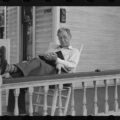Stealing Liam Rector

When I was a boy a boy when I was boy
I thought the language was a language
Would send me everywhere there was to go.I thought there was something to know
And I took off with a mind full of language
And a need to get away from what I tookTo be the stupidity around me.
I am a writer today because I read these lines in Liam Rector’s poem “Three Portraits of Boy” when I was 21. By the time I had finished the poem, I knew what I was going to spend the rest of my life doing. Before this, I had vague literary notions. Maybe I would work in publishing. Maybe I would go to Europe and write a coming-of-age travel novel. When I realized I was gay, I thought I would write a coming-of-age novel set in Berlin. Then I read Liam Rector.
In the first portrait a man leaves behind the religion of his youth, only to be haunted by the old hymns when he has his breakdown at Harvard. In the second, men drink themselves numb in port cities. The third portrait is in the voice of the brother from the first and ends:
So when he wrote from college about his breakdown,
When he wrote to say he had gone down, I first
Offered to go there but then he told me to stay put
Until he made his way back to where he came from.
At the time, I was an undergraduate at Bennington College. I had transferred there from Tulane University in New Orleans. Katrina had struck in the beginning of my sophomore year, and I had gone to Harvard for a semester. When I returned to New Orleans, I had a breakdown. I left school to recuperate with my family in Michigan before transferring to Bennington the next spring. The circumstances of that poem corresponded to my life so as to be spoken to from the grave.
Liam Rector, the founding director of the graduate writing program at Bennington, didn’t teach undergraduates, so I never had a class with him. I never met him. It was instead his dying that brought me to him. He killed himself the summer after my first semester at Bennington. Some say his health was in decline. Others say that he exaggerated these claims to justify something he wanted to do; he certainly hints at suicide in many of his poems. I have no interest in investigating Liam Rector’s health. Liam Rector wasn’t even his real name. Here was a man who had constructed so many personas for himself, both on and off the page, what’s the point of invading his privacy? When I heard he died I thought the least I could do was read one of his poems. I went to the library, found his second book American Prodigal, and opened it to a random page and there it was, “Three Portraits of Boy,” and there in the stacks on the second floor of Crossett Memorial library I knew I was going to be a writer.
I checked the book out and brought it to my room. It was a signed copy, addressed to the president of Bennington College, Elizabeth Coleman. “For Liz,” it reads, “for giving me the chance to make some history here, for making some yourself, & for taking a stand—with respect and affection—Liam.” At the time I thought her donating the book to the library was a ghastly thing to do, although I know now that one cannot keep all of the books written by one’s colleagues.
It seemed wrong to return the book and leave it to collect dust on the shelf. I felt as if his signature had imbued it with a part of his soul, that when I read his poems out of this edition he was speaking them directly to me. I renewed the book each time it was due, even over the summer. I wanted to keep it, but I also felt guilty taking a book given to the library. I made a compromise. I bought a replacement copy at the campus bookstore and took all of the accoutrement from the original: the Dewey decimal coding from its spine, the barcode from the back. As far as I know, until publishing this essay, no one was ever the wiser, and I was happy that, since I had replaced a hardcover edition with a paperback one, the exchange still felt like a steal.
I have carried this book with me everywhere, on road-trips across the United States, on a backpacking trip to Europe, weekends at the beach. It is a talisman of sorts, although I don’t know what it is protecting me from. Or maybe that’s just it, it’s a comforting object that doesn’t offer much comfort at all.
2.
Rector was good friends with Donald Hall and Jane Kenyon, and after Jane Kenyon passed away he wrote a short essay in tribute to her in which he praises her later poems and her teaching, while also stating unapologetically that he doesn’t care for her first book. A surprising admission to find in a eulogy, although it is the sort of thing that is his trademark: honesty, if in poor taste. I thus feel free to write that I don’t care as much for his first book The Sorrow of Architecture (1984), a book that perhaps contains too many styles and voices to cohere, and teeters between Neo-Formalist and New York School. And then there is a curious poem, “Carpenter,” which reads like an unsuccessful Bidart imitation.
And yet the book still has a compelling momentum. If his poems were a film it would be Husbands and Wives; the mores of urban heterosexuality projected upon buildings that are expected to somehow contain or alleviate the desires and sorrows of the populace. It is one of the major themes of his work, and he establishes it in his first book with characteristic starkness. The voices and anecdotes accumulate throughout the collection until they crescendo in the title poem, which elegantly elaborates upon the theme in such a way that suggests the rest of the book were a dress rehearsal for this one passion play of marital ambivalence. It begins:
Out of the building, out of the buildings the great sorrow
of not knowing what to do
pours; the great movement of not knowing
where to go, goes. By the hour
it has been moving towards this;
the snow which fell for an hour
reminded everyone of the suspension—
call it an image where the forgotten
is gazed at again, the long hour
of our marriage bringing us to this.
For Rector, the question of how to live was both civic and romantic. His second book delves more into public concerns, but here he simply states that none of us know what to do with ourselves, and that we attempt to stuff this ignorance into our buildings of work and residence, only to have it come pouring back into the streets. It’s a poem about a man who doesn’t know how to love so he walks around outside a lot. The architecture of the poem, as well as that of the city, is built to contain sorrow, the simple sorrow of not knowing if one wants to stay married.
His second book, American Prodigal (1994), is my favorite, though I have both literary and sentimental reasons for this assessment. Both wider in scope and more focused, American Prodigal abandons the sprawling New York School style and pushes beyond the confines of the city limits. The poems touch on his grandfather’s farm, first love, lightning bugs, Baltimore, Munich, suicide, Elizabeth Bishop, and yet they are held together by his voice and by his use of a form suitable for that voice, the free verse tercet. It is a form of both stability and antagonism, a form that creates an oral momentum that has more dynamism than the couplet. It also gives him space for un-patterned slant and full rhymes that delight and surprise, rather than dominate the line.
The book is organized into three sections: The Out of the Woods Monologues, The Meathouse Monologues, and The Tidewater Monologues. Each of the sections begins with an epigraph; the first and last come from Camus, the second a line from Bob Dylan’s “Chimes of Freedom”: condemned to drift or else be kept from drifting.
The poems themselves drift between subjects in one long elegy. By labeling them as monologues, we are happy to follow his voice as he reveals his own character as well as that of his country. In “Working Wrong in the Late Republican Eighties” he blends cultural critique with a compelling if vulgar plea for secular humanism. He quotes American Romantics Gary Snyder and Robinson Jeffers, while also indicating that being wise on the mountain isn’t enough: we all must get into the mania of America if we want to alter the course. The only thing he hates more than not knowing what to do is being paralyzed by indecision, so he thrusts forward with a contagious kinetic energy. It’s as if his answer to the car not driving right is to cut the brake lines.
It is an old-fashioned notion that one’s private and public lives are connected; that the poems one reads could influence how and who one loves, who one votes for. American Prodigal is both a personal and political elegy. We are bastards in a bastard country, the poems demand, and demand that we see this clearly, so that we may clearly see ourselves and maybe, just maybe, figure out how to live.
Rector’s third and final book, Executive Director of the Fallen World (2006), was published one year before his death. While they might not be characterized as optimistic, the first two volumes contain at least a sense of possibility, a sense that is absent in his final collection. Stylistically, he embraces a shorter line—the pages are dominated by white space. The smallness of the line also feels more intimate, like he’s trying to hand something to you, touch you, rather than deliver an oration.
The title alludes to the organizations and programs he helmed: the Bennington Writing Seminars, The Associated Writing Programs, and The Folger Shakespeare Library. The implication is that the humanities, the examined life, cannot, or will not, save this country. That our endeavors may only change ourselves. He comes to this resolution bemusedly while clinging to the moments of beauty and connection contained even in a fallen world. If his second book is elegy, his third is epitaph—a last chance to capture the ineffable sorrow that inspired his career.
Many of the poems are about friendship and the collection is well populated, but unlike the first two books, which use names in a rambling O’Hara-esque fashion, Executive Director of the Fallen World explores the poet’s friendships methodically and meditatively. In the poem “Best Friend,” the poet and his best friend sail to the Bahamas, although the poet confesses secret intentions. He writes:
I dressed
In my best and flewDown from Manhattan,
Where I had been feeling
Punishing failureAnd reading Hart Crane.
I brought a robe
I intended to wearWhen I jumped off
Our boat mid-sea. I never
Told you that,Old friend, and I
Apologize now.
What if I had left you mid-ocean
To sail alone?
3.
All writers at some point outgrow their first loves or influences. I respect his body of work, and I will always be grateful to him for showing me how to be fearless on the page. He teaches me how to be a socially conscious writer without falling into the trappings of dogma or self-righteousness, a talent that is becoming increasingly necessary. Sometimes I find his poems too aggressively heterosexual: I can only read about the marriages, and girls, and backseat hook-ups so many times. There is also a machismo that accompanies poems about fast cars, drinking, and Robert De Niro. That is not Rector at his best. When it comes to the intimacies of friendship, a surprisingly difficult subject to write about, however, he excels.
In my last year of college I became friends with a transfer a year younger than me. He was preternaturally good-looking and intelligent and a great writer. We frequently traded drafts—my poems, his stories. For a few months I would have considered him my best friend. We were never lovers, although I wanted to be. Instead I asked him to read Rilke to me in German, and he obliged.
After graduation I spent the summer in Boston while he was doing an advertising internship in Providence. We visited each other often and on one occasion we drove down to Newport, got stoned, and ate lobster rolls. I can’t remember how it started, but when we got back to his apartment he began reading to me while I drifted to sleep on the couch. In the morning he asked when I had fallen asleep. I told him the last poem I remembered and he laughed. He had read to me for an hour after that—almost all of American Prodigal, and then from Frank Bidart’s Into the Western Night. The poem I last remember him reading was one of my favorites of Liam’s, “We Should Not Let Munich Slip Away”:
There was rain which soon turned
To snow and no place we had in mind
We wanted to go so we stayed in bedAnd made love all afternoon…
As the lamps lit the street
We got up from each otherBecause there was money to be made
Because we did not grow our own food,
Because someone else owned that place;So we got dressed for the club where
We went to play the music, where the people
From the offices spilled in from their day,And you said we should go to Munich soon,
That we should not let Munich slip away—
That the work, the money was better there,That things were not getting better for us here,
And that you had some money, some money
You’d not told me about—money squirreled away.All my life it’s been a question:
Whether to go or to stay.
I woke up violent with fear one morning,I woke up violent with hope one morning,
I picked up this horn one morning,
And it played me until I was away.
My friend and I grew apart. He ended up working in advertising in New York, then Paris. I moved out West and worked as a massage therapist until graduate school where I studied poetry. Some years back we were supposed to meet in Chicago, a meeting that never happened because a mutual friend from college died suddenly in a crash.
He hasn’t returned my messages since, but I’d rather have the memory of him reading poetry to me. It is a simple, not-quite-satisfying comfort, the kind that Liam Rector so often elegizes. To have been read poetry to by someone who loved me, even if it was not in the way I wanted was, at times, enough.
About Trenton Pollard
Originally from Michigan, Trenton Pollard received an MFA in Poetry from North Carolina State University and is a Teaching Fellow at Columbia University. He has poems forthcoming in Passages North, Bennington Review, and Dialogist, and has recently been published in Denver Quarterly and North American Review. He lives in Queens.





